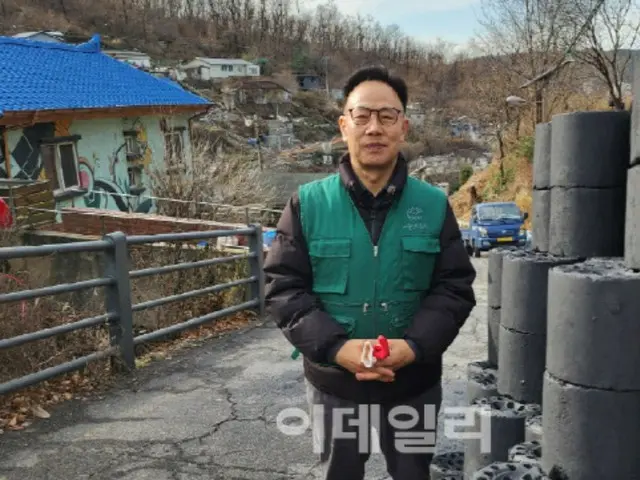As the economy cools down due to high prices and high interest rates, it is expected that the cold weather will intensify and the damage will be felt by the poor who have difficulty buying energy.
Ru. According to the Briquette Bank, a volunteer organization that distributes free charcoal briquettes, 86% of the people who purchase briquettes (74,167 people) are basic livelihood security recipients (63,991 people).
, there is an urgent need to distribute charcoal briquettes. Heo Ki-bok (67), the representative of the Food Table Community and the briquette bank, distributes charcoal briquettes to help the poor, who have difficulty buying energy, enjoy a warm winter.
It's a helper who goes around like that. CEO Heo established the briquette bank in December 2002, and has been distributing charcoal briquettes in 17 cities, provinces, and 31 regions across South Korea. Purchasing with support from individuals and companies
For 21 years, we have been distributing the collected charcoal briquettes from October to March. CEO Heo said in an interview held on the 12th at Gemi Village in Hongjae-dong, Seodaemun-gu, Seoul.
Before the COVID-19 pandemic, approximately 4.9 million charcoal briquettes were donated, but last year only 4.026 million briquettes were collected," he said, adding, ``We expect it to be difficult (to collect as many charcoal briquette donations as last year) this year. death
We had set a donation goal of 3 million charcoal briquettes, but we are still in a very short supply." He went on to say, ``I visited companies directly and asked them, but due to the soaring labor costs and raw material prices, they decided not to carry out donation activities.''
) There is an atmosphere of feeling like a burden." In 1998, CEO Heo, who formed a food table community to provide meals to the poor, turned his attention to charcoal briquettes in 2002. at that time
CEO Heo decided to start a business distributing charcoal briquettes after witnessing elderly people spending a week in a cold room because they didn't have one briquette, which cost 300 won (about 33 yen). Named briquette bank
The idea behind this is that, just as banks keep money and return it with interest, they keep the charcoal briquettes and give them out. ``We started by distributing 1,000 charcoal briquettes,'' he said.
"After building a place where we could store a lot of charcoal, we loaded it into carts and distributed it around," he recalled. The briquette bank decides on a theme every year and distributes charcoal briquettes, and this year's theme is "
Charcoal briquettes become rice.” Representative Heo compared charcoal briquettes to rice by saying, ``In this day and age, there are people on carbohydrate diets, but rice is an important thing that we have to eat every day.''
"We need charcoal briquettes every day, and I think they are just as important as rice in winter life." He continued, ``Charcoal briquettes symbolize poverty, but they actually feel warm and heartwarming.''
He added, ``Charcoal briquettes cannot speak, but we can learn a lot from burning ourselves and warming others.'' He also spoke about the unfortunate situation at the scene. Local governments, etc.
They are replacing charcoal with boilers that burn kerosene, but the reason is that such a policy could have the opposite effect on the poor. He said, ``kerosene boilers look better and smell better than charcoal briquettes.''
However, in order to run a kerosene boiler for one month, it takes 1.5 drums of fuel, which costs about 500,000 won (approximately 55,000 yen)."
It costs 125,000 won (approximately 13,800 yen) a month if you use it for a while, but it's about a quarter of the cost compared to kerosene." Furthermore, ``Households that use charcoal briquettes have an average income of 350,000 won.
"It is difficult to pay the kerosene bill if you pay the electricity bill and rent," he said, adding, "Many people are feeling even colder after switching to a kerosene boiler. the voice of
I want you to hear more." Finally, Representative Heo expressed his gratitude for the support. CEO Heo said, ``In 2002, the price of briquettes was 300 won per piece, but until now, automatic transfers were available.
"There are people who donate 300 won each," he said, "Even though it seems like a small amount, I'm very grateful for that kind of feeling." He continued, ``With support from individuals, mass media
Through Mi, it became known to many people, and I was grateful when companies scrambled to offer their support," adding, "I wish someone would donate 100,000 pieces each.
"However, I would be really grateful if you could just donate 850 won (approximately 83 yen), which is the cost of one charcoal briquette."
2023/12/14 07:08 KST
Copyrights(C) Edaily wowkorea.jp 107

